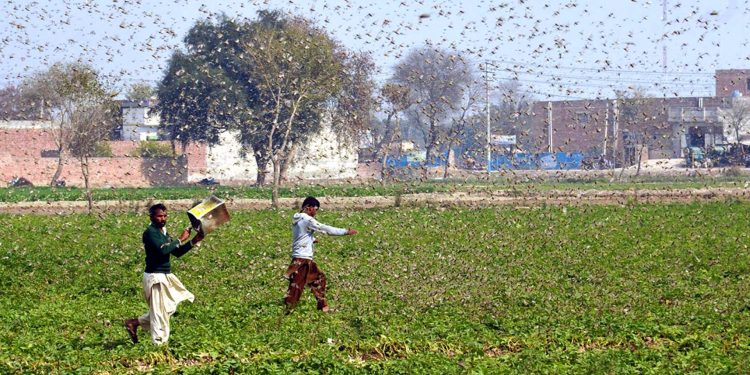The coronavirus pandemic is sweeping across India with the number of cases spiking in large numbers every day. Amid this episode comes the locust threat. The insects are feeding and breeding in the agricultural fields, the same very fields which feed human beings. Currently five to six states in India are facing locust threat. They fear wide-scale crop destruction due to locust attacks.
Huge appetite
What else can they do? When a swarm of locusts invade agricultural fields, the numbers are huge. Approximately 80 lakh insects make up a swarm. Just visualise what they can do to a paddy field in minutes. The life span of desert locusts is just 90 days, but then that is sufficient enough for them to wreak havoc. The swarm stays together, eats together, breeds together and destroys everything together.
It is pertinent to mention that since desert locusts are very active, they have huge appetites. So when a swarm of locusts embark on eating the effect is devastating. Scientists have said that a single swarm can consume food that is eaten by 2,500 people every day.
That is exactly what the locusts are doing in the states of Rajasthan, Gujarat, Maharashtra, Madhya Pradesh, Punjab and also Uttar Pradesh. Field after field of agricultural products are being gobbled up by these locusts which seem to appear out of nowhere.
Very fertile creatures
Food is an essential ingredient in living beings and for these locusts it is very essential. As with food, their breeding process is linked. These insects are highly fertile and they increase by huge numbers as they eat.
Their biological makeup has strong radars for moisture and greenery. Hence they are easily able to locate crops. Their ability to adapt in any weather conditions makes them all the more dangerous. When locusts arrive they bring along with the word in capital letters ‘Destruction’. When they migrate, they raid green crops. Their migration follows the path of the prevailing wind. They eat green and leafy plants.
Destination India
But then why the locusts have suddenly become a huge threat to India? This is because of the climate changes in Saudi Arabia and the Arabian Peninsula in the last couple of years. Incidentally this is not the first time that locusts have attacked India. It happens every season during the monsoons. They arrive in Gujarat and Rajasthan every year. On an average 10 locust attacks or swarms are seen in India in a normal year.
However, things changed with Saudi Arabia experiencing two cyclones in 2018. Lakes formed in the Arabian Peninsula, which is considered one of the driest and most uninhabited regions in the world. This was a first in some 20 years. It led to blossoming of greenery and food aplenty for the locusts. They started breeding at an amazing speed leading to swarms seeking food elsewhere.
Early monsoon brought in locust attacks
Some of the new swarms of locusts with the help of heavy winds travelled to Iran and Pakistan. They had what they wanted – moisture and greenery and they feasted on it. By April 2019, locusts had destroyed an estimated 40 per cent crops in Pakistan, creating a serious food security risk in the country.
And once food was exhausted in Pakistan, the next destination was India. Last year, western Rajasthan had early monsoons, about six weeks earlier than normal. The monsoon brought greenery and with it the locusts. They crossed the borders and attacked and devoured any agriculture produce that came in their way.
Under normal weather conditions, the locust swarms come to India in July. They breed for one season and leave for Pakistan-Iran in October.
But an early monsoon brought them earlier. Rajasthan also had an extended session of monsoon which lasted till number last year. It gave the locusts a longer span in India and they managed to breed three times. The effect was simply devastating.
More attacks on the anvil
This year also some parts of Iran and Pakistan received unseasonal heavy rains in January. Due to the rains greenery developed and with it came the locusts in mid-March. Once the food was exhausted, they moved towards India and the results are there for everyone to see.
Scientists have said locusts have a keen sense of direction. With wind guidance, they can revisit the same locations time again. This year the numbers are more and the swarms have grown in sizes. Hence attacks have not just been limited to Rajasthan and Gujarat like it happens every year. On the other hand due to the increase in numbers, the insects now have spread to other states.
So if you thought you had managed to control the spread of coronavirus, don’t just relax. Brace for more… be ready because nobody knows when the next locust attacks will come. When it comes, there is no chance to protect agriculture unless protection measures are taken beforehand.
Protection measures
So what can be the protective measures? Desert locusts travel and eat during the time. They rest at night, so they can be destroyed using insecticides.
The Food and Agriculture Organisation (FAO) in India has laid out a standard operating procedure to deal with locust menace. They have asked each state to monitor sandy areas close to green vegetation. Locusts usually like to rest on large stretches of sand during the night. So if swarms are spotted, actions can be taken.
Agencies






































